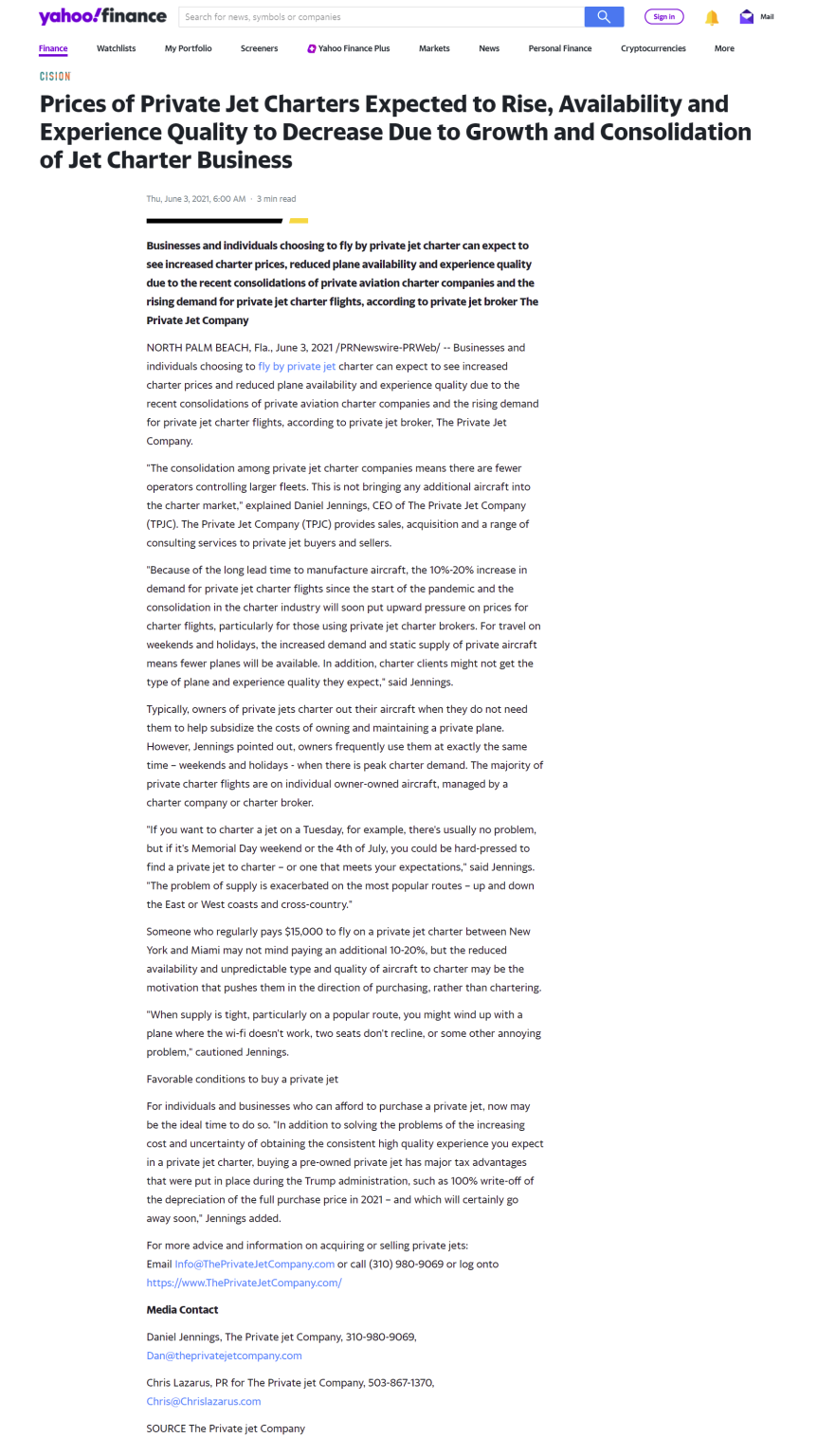
Increasing Use of Sustainable Aviation Fuel for Private Jets Expected to Motivate More Buyers
“The development of Sustainable Aviation Fuel can help reduce solid waste, clean the air, reduce our use of fossil fuels, and lower carbon emissions, but it will also enable aviation to continue to grow on a far more sustainable basis,”
said Daniel Jennings, CEO of The Private Jet Company
An overview of the development to date of Sustainable Aviation Fuel and implications for the environment and for the market for private and business jet aircraft, according to private jet broker The Private Jet Company.
NORTH PALM BEACH, FLA. (PRWEB) MARCH 31, 2021
Private Aircraft Trends
Increasing Use of Sustainable Aviation Fuel for Private Jets Expected to Motivate More Buyers
While air travel accounts for less than five percent of global carbon emissions – compared to 28% from road vehicles, the global aviation industry has been under increasing pressure to go green.
In response, Sustainable Aviation Fuel (SAF) has been developed in the past ten years by both established and start-up energy companies (including SkyNRG, World Energy, LanzaTech, Verlocys, Neste, WasteFuel and others) using different feedstocks. With the backing of the International Air Transport Association (IATA), SAF has been used on over 300,000 flights by more than 45 airlines and by private jets, as well as by businesses, such as Amazon and Microsoft, which have pledged to lower their carbon footprint.
SAF is being made from a variety of reusable waste products, like recycled cooking oil, waste gases from industry, municipal solid waste, corn leaves and cobs, animal fat, as well as from plants grown in the desert with desalinated sea water. Due to current regulations, SAF must be mixed with conventional fuel. The reduction in greenhouse gas emissions resulting from the use of SAF depends on the feedstock and varies between 20-80% over the lifecycle of the fuel.
“The development of Sustainable Aviation Fuel is exciting news for several reasons,” said Daniel Jennings, CEO of The Private Jet Company (TPJC). “Not only can it help reduce solid waste, clean the air, reduce our use of fossil fuels, and lower carbon emissions, but it will enable aviation to continue to grow on a far more sustainable basis.”
The Private Jet Company (TPJC) provides sales, acquisition and a range of private aviation consulting services to private jet buyers as well as private jet sellers.
“As private jet brokers, we have many clients who are concerned about the impact of flying on the environment and very excited about the development of SAF. I expect that as it becomes more available, we will see an even larger increase in the number of private jet aircraft buyers,” added Jennings.
Since the beginning of the Covid-19 pandemic, TPJC has reported a significant increase in the number of private jet buyers – double the number of first-time buyers and 50% more repeat buyers in the fourth quarter of 2020 compared to the past several years.
For advice and information on acquiring or selling private jets:
Email Info@ThePrivateJetCompany.com or call (310) 980-9069 or go to https://theprivatejetcompany.com/
About The Private Jet Company (TPJC)
The Private Jet Company offers private jet sales & acquisition and private aviation consulting services in major markets throughout the world. Founded in 2005 with headquarters in North Palm Beach, FL and regional offices in Paris, France and Mexico City, Mexico, TPJC has completed over $2 billion of private aviation transactions for individual and corporate jet owners. In addition to assisting clients buy and sell private aircraft, the company works with aircraft management companies to reduce the burden of private aircraft maintenance costs and create income through chartering jets. TPJC also partners with aviation attorneys and tax experts to help clients maximize depreciation, reduce tax burdens and assist in import and export Certificates of Airworthiness.
Photo caption: Private jet being refueled. Sustainable Aviation Fuel (SAF) can lower carbon emissions up to 80% over the lifecycle of the fuel.
